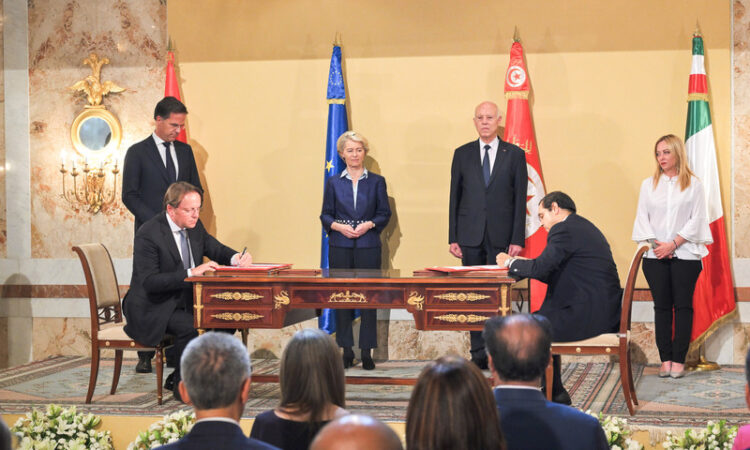
The European Commission has hailed its budget finance programme for Tunisia as having “yielded results on macroeconomic stability”— even as Tunisia’s autocratic president makes plans to force its central bank to directly finance his government.
In a response to parliamentary questions on 5 March, Oliver Várhelyi, the bloc’s neighbourhood commissioner, said that it had “yielded results on macroeconomic stability, public finance management reforms, and management of irregular migration flows.”
However, last month president Kais Saïed urged the Tunisian central bank to provide billions of dollars in direct budget finance to plug the government’s budget deficit — a move which economists warn is likely to lead to inflation and put more pressure on the Tunisian dinar.
Meanwhile, a bill allowing the central bank to finance the treasury, was pushed through parliament despite the objections of central bank governor Marouane Abassi, who leaves his post this month and has warned that it could push inflation above 100 per cent.
Although the EU-Tunisia agreement, which was brokered by European Commission president Ursula von der Leyen and Italian prime minister Giorgia Meloni last July, was viewed primarily as a ‘cash for migrant control’ deal, the financial aid that it offers has become a vital economic lifeline for Tunisia’s strongman leader Saïed.
The programme was thrown into doubt in October after Saïedreturned a €60m payment to the Commission, denouncing it as “derisory” and “charity”.
That prompted Várhelyi to retort that Tunisia was free to “wire back” the €60m if it did not want the cash.
On Monday (4 March), the EU commission confirmed that it had paid €150m in budget support to president Saïed’s government on 4 March. The funds are intended “to support Tunisia in stabilising its macroeconomic situation and its efforts to improve the management of its public finances and the business climate,” said the EU executive in a statement.
The EU executive added that the cash is the result of “positive steps it (Tunisia) has taken to render the investment climate more favourable,”
The funding is part of a programme worth up to €900m, and which also promises EU investment in renewable energy projects, railways and internet infrastructure, in exchange for Tunisia assisting the EU in controlling migration flows.
President Saïed sacked the government and elected parliament in September 2021, announcing that he would rule by decree. Since then, a number of opposition politicians and civil society actors have been arrested or detained, while a revamped constitution, which came into force in 2023, gave the president sweeping new powers over parliament and the executive.
Although Saïed’s government entered talks with the International Monetary Fund with a view to finalising a $1.9bn [€1.74bn] loan, these collapsed after Saïed accused the fund of “dikdats” and of imposing austerity.
In February, the commission announced an agreement with Mauritania, which has also been criticised over its human rights record, particularly on slavery.
A Strategic and Comprehensive Partnership with Egypt, which insiders say is close to completion, “features a strong emphasis on human rights”, according to Várhelyi, who did not provide any details.





